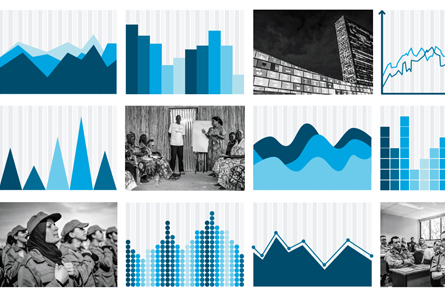Measuring SSG/R Results
Despite the growing body of knowledge on the performance of international assistance to national Security Sector Reform (SSR) processes accumulated through evaluations, there is still a lack of empirical evidence on what works, what does not, and why in the field of SSR.
In this context, DCAF seeks to raise critical questions on the approaches used to monitor and evaluate progress and provides recommendations for strengthening international approaches to monitoring, evaluating, and learning from international support to SSR on the basis of empirical research.

Workstreams/Projects
The lack of empirical evidence on what works, what does not, and why in the field of SSR is largely due to the limited public availability of evaluations as well as the lack of comprehensive studies that gather insights from a large sample of evaluations. To address this gap, DCAF compiled a database of over 100 publicly available evaluations in the area of SSR and conducted a comparative analysis of their methodological characteristics.
The research demonstrates that while SSR-related evaluations exist, their methodological rigour often varies considerably, and are not primarily designed to support learning. The study therefore raises questions about the confidence that can be placed on evaluation findings. It provides a number of entry points for strengthening the methodological approaches of SSR-related evaluations as a basis for moving towards improved learning from support.
This project has been funded with the support of the Folke Bernadotte Academy.
At the request of the UN’s Department of Peace Operations’ Office of Rule of Law and Security Institutions (OROLSI), DCAF undertook a project in 2012 seeking to better understand methodological approaches used by development and peacebuilding communities to measure impact, and how these could be applicable to measuring change in the area of rule of law and security institutions. This resulted in an SSR Paper mapping relevant approaches and methodologies to measuring impact of peacebuilding interventions on the Rule of Law and Security institutions.
The findings of the project were discussed with both UN and non-UN experts and practitioners at an expert workshop on "Measuring the Impact of Peacekeeping Missions on Rule of Law and Security Institutions" organized in 2012 by UN DPKO (now DPO), in collaboration with DCAF and with support from Switzerland and the UK. The objectives of the workshop were to seek advice on how to assess the impact of both headquarters and field-based rule of law and security institutions-related initiatives.
The workshop underlined that there is often much confusion among international actors on the meaning of the term ‘impact’ and highlighted avenues for improvement
Publications and further reading
- Measuring the Impact of Peacebuilding Interventions on Rule of Law and Security Institutions, Vincenza Scherrer, (SSR Paper)
- Measuring the Impact of Peacekeeping Missions on the Rule of Law and Security Institutions, (Expert Workshop Report)
PAST RESEARCH
Contacts
Vincenza Scherrer, Deputy Head, Policy and Research Division (v.scherrer@dcaf.ch)

